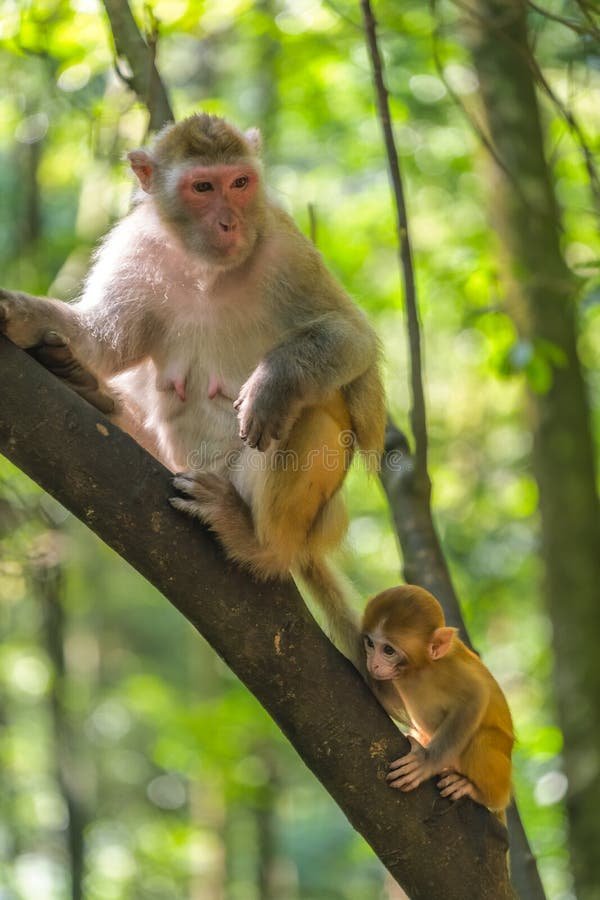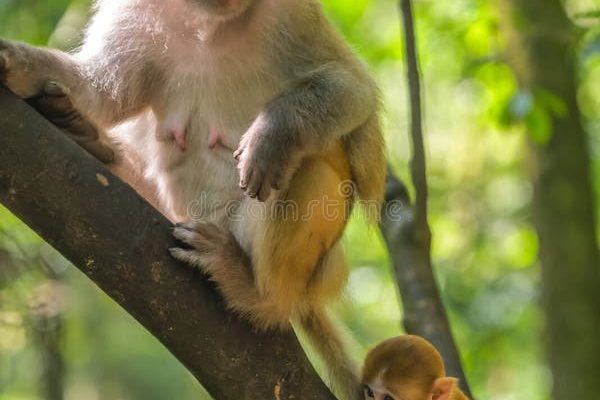
Imagine each monkey troop as a small community, where every member plays a role in nurturing the tiny newcomers. Raising young monkeys isn’t just the job of the mother; it’s a whole team effort. Just like in our human families, there are lessons to be learned, struggles to overcome, and joy to be shared. Let’s dive into this fascinating aspect of monkey life and see how their parenting methods compare to our own.
Bonding Begins Early
From the moment a baby monkey is born, bonding is key. Most baby monkeys cling tightly to their mothers, often hanging on to them like a toddler clinging to their parent. This close contact isn’t just adorable; it’s crucial for the baby’s survival. The mother carries her infant everywhere, protecting them from predators and ensuring they’re safe during their early, vulnerable months.
This bonding doesn’t only happen during the day. You might be surprised to know that mother monkeys often groom their babies, which strengthens their relationship. Grooming helps remove dirt and parasites, but it also reinforces emotional bonds. It’s like a monkey hug that says, “I love you and I’m taking care of you.”
Learning Through Observation
You might wonder how baby monkeys learn to navigate their world. Well, they’re natural observers! Young monkeys spend a lot of time watching their mothers and other troop members. From foraging for food to socializing with other monkeys, the young ones learn by imitating their elders. It’s a bit like watching a cooking show—first, you watch, and then you try it yourself.
The learning process can be filled with little mistakes. For example, a baby monkey might try to grab food from a branch but miss and tumble to the ground. But don’t worry! Their mothers are usually nearby, ready to catch them or help them back up. This kind of support is vital for building confidence and skills.
Shared Parenting Responsibilities
In many monkey species, raising young is a shared effort. Yes, mothers take the lead, but other troop members step in to help. You might see siblings or even unrelated monkeys take turns looking after the little ones. This teamwork helps create a nurturing environment.
Let’s think about it this way: it’s like a babysitting co-op. When different members pitch in, it allows mothers to take breaks or attend to their own needs. This shared responsibility not only benefits the mothers but also helps strengthen social bonds within the troop. It’s a community effort, and every helping hand counts.
Protective Measures
Protecting their young is a top priority for monkey parents. Mothers are always on alert for potential threats. If a predator, like a snake or a large bird, approaches, you might see mother monkeys immediately wrap their arms around their babies. This instinctual behavior is crucial for keeping the little ones safe.
Additionally, some species of monkeys have developed unique strategies for protection. For example, while some monkeys may create a barrier around their young, others may leave the babies in the care of a trusted troop member while they scout for food or assess dangers. This proactive approach ensures that the babies are always looked after, even when the mother is busy.
Food and Nutrition for Baby Monkeys
Just as we focus on healthy meals for our kids, monkey mothers pay attention to their babies’ diets. In their early months, baby monkeys rely entirely on their mother’s milk. This nutrient-dense source of food provides everything they need to grow strong and healthy.
But as the babies get older, they start to munch on solid foods. Mothers often introduce their young to fruits, leaves, and insects, teaching them what’s safe to eat. It’s a bit like a culinary lesson in the wild! Foraging together not only helps the babies learn about nutrition, but it also builds a sense of teamwork as they explore their environment side by side.
Playtime and Social Development
Playtime isn’t just fun—it’s essential for developing social skills. Young monkeys engage in playful activities, chasing each other around trees and swinging from branches. This play teaches them important behaviors, such as how to interact with others and establish friendships.
Watching baby monkeys at play is a joy. They tumble, screech, and often end up in silly situations. It’s kind of like kids on a playground, learning to navigate friendships and rivalries. Through these interactions, they develop the skills they need to thrive in their communities as they grow older.
Challenges Faced by Monkey Parents
Raising young monkeys isn’t all sunshine and laughter; it comes with its challenges. One significant threat is habitat loss due to deforestation. As their homes disappear, monkeys have to travel farther to find food and safe spaces to raise their young. This can increase stress levels, making parenting even more difficult.
In addition to environmental challenges, social structures within troops can shift. If a dominant male takes over a troop, it might put mothers and their babies at risk. Mothers must navigate these social dynamics carefully to protect their young. It’s a tough balancing act that requires keen instincts and awareness.
Adaptation and Survival
Monkey parents are remarkably adaptable. If conditions change, they often find new strategies for raising their young. For instance, in areas where food is scarce, some monkeys may alter their foraging habits or move to different territories to ensure their babies can thrive.
This adaptability showcases the resilience of monkey families. They learn to cope with challenges and find solutions that work for them. It’s a testament to their intelligence and understanding of their environment, allowing them to continue raising young successfully even in difficult circumstances.
So, when you think about how monkeys raise their young in the wild, remember it’s a beautiful blend of love, community, and survival. From bonding and shared responsibilities to protection and playful learning, these creatures demonstrate deeply intuitive parenting skills that resonate with our own experiences.
Next time you spot a troop of monkeys, take a moment to appreciate the dynamics at play. Their parenting styles may differ from ours, but at the core, it’s all about care, connection, and the joy of nurturing the next generation. Just like us, they strive to give their young the best start possible in a complex world.

